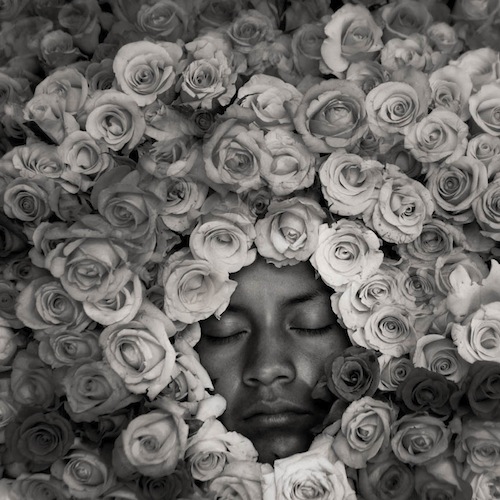Russell Monk: His Camera, His Neighbors and My Words

Someone who knows something. Someone who has neighbors. No one knows who lives next door. No one knows who the other is. The more we know, the less we know of ourselves. The philosophical exploration of the depths of your being tries to be obsolete in knowing yourself. This is even more obsolete when you enter my country. If there is a country that can exhaust these paradigms in a few hours, that country is Mexico. And so as renowned photographer Russell Monk entered Mexico his work as a war-photographer, musician, and chronicle writer was transformed. And as he was a photographer, he was a neighbor, and as he was a neighbor he was confirmed as a photographer.
So he settled for a while in a neighborhood in the outer region of San Miguel de Allende and started portraying people around him, those who were in his proximity, his neighbors, his fellow man. The difficulty of knowing oneself, the facade before your presence can be circumvented through imagination. And the game: the possibility of obtaining one of those faces, the mark of life’s pain, what gives us work, laughter, and the possibility to forget. In a playful desire and one that’s based in games, Russell Monk invited his neighbors. And one took lime and covered himself entirely with it, or the butcher came directly from his shop as the photographer asked, with a bucket of blood “if necessary.” All of this became part of the game.

Thus came Concepción, a name that means “Conception” in English while her nickname is “Concha,” which means “Shell”... the photograph is the translation of a moment, and all translation is an approximation. The true being is trapped on its way to being captured. So “Concha” placed her head inside a bird cage. Russell Monk says that she’s a woman with character, tremendous, and the choice of the cage might mean nothing, yet it intensifies that character. My job, “my game,” will be to make a parallel to photography based on words. The game of Russell is to capture and to participate in the construction of an allegory of the other. The allegory of Concha’s fury is her in a cage. My own allegory would be to give a reading (by writing “a poem”) to that image, attacking it with words. For now what comes to mind is the “Monologue of the Cell” by Rosario Castellanos:
They forgot about me, they left me aside.
And I don’t know who I am
because no one has told me my name; because no one
has given me life, watching me.
An act rots inside me, the only one
I don’t know and can’t meet
because a pair of hands is not enough.
(The other is the space in which it’s sown
or the air which grows
or the stone to be torn apart).
I can’t find the poem to which the phrase “One day I will leave this cell named Rosario” belongs. And if that same cage is the disguise of “Concha.” The disguise of “Shell.” The costume of an approximation, the investigation of a game. And knowing, thanks to the poem, that to leave the disguise is to die, it isn’t simply leaving the disguise behind. Under the disguise, the face opens up and reveals the accumulation of one self. So the seller of roses is immersed in them, and as the roses surround his face, his face reveals its true countenance.

And the mind? The mind is in the space that opens between his eye and the camera. My words don’t exist yet (I know it from the start) in disguise, dressed from others, or dressed from oneself pushed to the extreme. It’s just another day in the studio, one that’s woven into the nature of the saint, into the danger against which our skin has grown thicker, into the deep distrust of that neighbor, the photographer, the danger that doesn’t keep them from going to his studio and facing the camera. A world of wasted hours are accumulating in their eyes and nothing can close the circle of time that falls apart from me. You have to start from an infallible defeat. And then, maybe... Now I imagine the moment in which “Concha” retires from the mind’s cage and leaves that same neighborhood where she lives a few houses down from Russell Monk. I imagine her thinking of something like those phrases of Rosario Castellanos’s while moving away from her neighbor, towards her own destiny. These are those phrases:
I will not be ashamed of these empty hands
nor this hermetic cell named Rosario.
On the lips of wind I have been named
tree of so many birds.

P.S. It’s a necessary corollary to say that I’m not sure there exists a relationship between poetry and photography beyond the way they approach the impossible. Aside from the matter he wants to capture…that other, the neighbor. There are two ways here, the photographer and the poet take the same street, but it leads them to two different mountains. We both reach our destination equally disheartened, fatigued, and entirely human.
Translated from the Spanish by Torin Jensen
Painter and poet Valerie Mejer was born in Mexico City. Her poems explore containment and fragility,...
Read Full Biography

